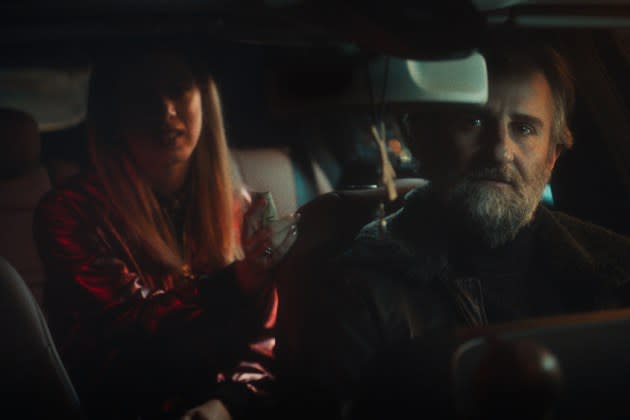‘The Last Taxi Driver’ Steers Its Frustrated Protagonist Toward a Painful Reckoning Over a Life Going Nowhere Fast
- Oops!Something went wrong.Please try again later.

A middle-aged man grappling with his thwarted ambitions grows obsessed with a beautiful young woman. The fallout threatens to unravel the fraying seams of his precarious, frustrated life in Stergios Paschos’ “The Last Taxi Driver,” which world premieres in the main competition this week at the Thessaloniki International Film Festival.
Produced by Athens-based Filmiki, Paschos’ sophomore feature stars Kostas Koronaios, Marissa Triantafyllidou, Ektoras Liatsos and rising actress Klelia Andriolatou, last seen in Netflix’s first Greek original, “Maestro in Blue.” It’s one of four films from first- and second-time Greek directors vying for the Golden Alexander in Thessaloniki.
More from Variety
“The Last Taxi Driver” follows Thomas (Koronaios), who works the night shift behind the wheel of a yellow cab and lives with his wife, Maria (Triantafyllidou), and their teenage son, Tassos (Liatsos). A poetic soul who studied literature in university, he’s never quite managed to live up to his expectations, going through the motions of a frustrated family life.
That life is suddenly upended when a customer commits suicide while Thomas watches, aghast, through the rearview mirror. He soon meets Eleni (Andriolatou), the dead man’s long-lost daughter, and develops a passionate attachment when he convinces himself that she offers a way out of his dead-end life — an obsession that pushes Thomas to the brink.
Speaking to Variety ahead of the film’s premiere, Paschos says “The Last Taxi Driver” was inspired by his reflections on life, aging and the many roads not taken as we grow older. “I always had a fear that if I wasn’t able to fulfill some dreams that I had, that maybe I would end up around 50, with a lot of suppressed feelings inside me,” he says. In the character of Thomas, he adds, he sees a man that “could be me in 15 years from now, living a totally different life.”
The film marks the director’s long-awaited follow-up to his 2016 debut, “Afterlov,” which scooped the Youth Jury Prize for best picture after its premiere at Locarno’s Cineasti del Presente. Bringing the film to completion was a long journey, marred by funding challenges in Greece, the dramatic interruption of the coronavirus pandemic and the very nature of the script itself. “Everything with this film was difficult — from scratch up until the very end,” Paschos says. “When you have an idea, you never know how difficult it will be to bring it to life.”
That challenge owed in part to the nature of the film’s inward journey. For all the time he spends behind the wheel of his taxi, Thomas’ most important destination is, ironically, an interior one — something that doesn’t easily lend itself to an onscreen depiction. “Mostly, the film is like a psychic landscape, and this is not something easy to write. And also, not easy to sell,” Paschos says, laughing.
The director acknowledges that his character study bears at least a passing resemblance to the ’70s cinematic classic by Martin Scorsese referenced in the title — another portrait of a troubled cab driver slowly coming undone at the seams. But for the most part, he says, that’s where the similarities end.
“I want to avoid comparing the two films. I don’t want to compare my film with this masterpiece,” says Paschos, who counts among his biggest influences a landmark of American cinema that earned an Oscar nomination for leading man Robert De Niro.
“It’s a masterpiece that has affected me in many ways, and I think that pieces of the heart of the original ‘Taxi Driver’ are everywhere in film history…. But I don’t think [‘The Last Taxi Driver’] is similar in its film language.”
Paschos says he “wanted to make a film that looks like a noir film, that plays with this genre, but also to be an existential film — a noir film that there’s no good guy or bad guy. There’s only one confused guy, but he’s looking for himself — not someone else,” he continues. “The trouble is inside, not outside. It’s something that he has to overcome in himself.”
The director, whose first film straddled the line between drama and comedy, says he doesn’t believe in “pure genres” when it comes to recreating life onscreen. “You can always find room to play with genres — with screwball, with romance. I like this idea, this playfulness. I like when I see in films the tone to change rapidly,” he says. “I like this element of surprise. I think it better captures the essence of life, that can be all these things together.”
The Thessaloniki International Film Festival runs Nov. 2 – 12.
Best of Variety
Sign up for Variety’s Newsletter. For the latest news, follow us on Facebook, Twitter, and Instagram.
